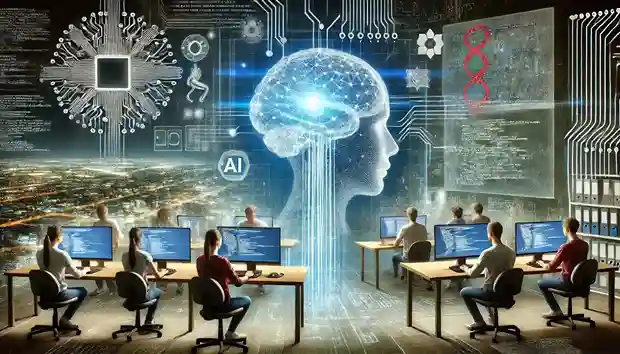Artificial Intelligence (AI) has revolutionized various industries, and software development is no exception. In today’s fast-paced world, AI plays a pivotal role in improving productivity, enhancing user experiences, and driving innovation in software development processes. Here’s a look at how AI is transforming this field:
1. Automating Repetitive Tasks
One of the key benefits of AI in software development is its ability to automate mundane and repetitive tasks. From code formatting and refactoring to bug tracking and fixing, AI-powered tools can handle a range of activities that were previously time-consuming for developers. This helps developers focus on more critical, creative aspects of software development.
2. Enhancing Code Quality
AI algorithms can analyze code for potential issues, bugs, and inefficiencies. By providing suggestions for improvements or automatically fixing known issues, AI helps to ensure higher-quality code and better overall software performance. These tools can also flag security vulnerabilities, reducing the chances of cyber-attacks or data breaches.
3. Smart Code Completion and Suggestions
AI-powered integrated development environments (IDEs) can provide code auto-completion and smart suggestions based on the context and historical patterns in the codebase. Tools like GitHub Copilot, powered by OpenAI’s models, enable developers to write code faster and with fewer errors by predicting the next line of code or suggesting alternative implementations.
4. Bug Detection and Debugging
AI can improve the process of bug detection and debugging. Traditional debugging methods require developers to manually sift through lines of code, which is both tedious and time-consuming. AI models can analyze codebases, predict potential errors, and even suggest fixes based on previous coding patterns. This significantly reduces the time spent on identifying and fixing bugs.
5. Personalized User Experience
AI also plays a crucial role in enhancing user experiences in software applications. AI algorithms can personalize content, recommendations, and features within an application based on user behavior, preferences, and feedback. This leads to more intuitive and engaging software solutions that cater to individual user needs, which is a key factor in customer retention.
6. AI-Driven Testing and QA
Software testing is another area where AI has made significant strides. AI-driven testing tools can automate the process of running test cases, detecting failures, and generating test reports. These tools can even predict the areas of the code most likely to fail based on previous test data, allowing teams to prioritize testing and improve overall software quality.
7. Predictive Analytics for Project Management
AI can also help in managing software development projects by analyzing past project data and providing insights into timelines, resource allocation, and risk factors. Predictive analytics can forecast potential delays and help managers adjust plans proactively, reducing project bottlenecks and improving efficiency.
8. Natural Language Processing (NLP) in Development
AI’s Natural Language Processing (NLP) capabilities are being used in software development to create more intuitive interfaces and interactions. For example, NLP can be used to convert user requirements written in plain English into code or to enable chatbots and virtual assistants that help with coding queries and documentation searches.
9. Continuous Integration and Continuous Delivery (CI/CD)
AI can enhance the CI/CD process by automating code integration and delivery, ensuring that new code is continuously tested, deployed, and monitored. AI can even predict potential integration issues and recommend changes before code reaches production, minimizing downtime and streamlining release cycles.
10. Optimizing Software Maintenance
Once software is deployed, AI continues to play a crucial role in its maintenance. AI tools can monitor software applications in real time, detect performance issues, and suggest optimizations or automatic patches. This proactive approach to maintenance ensures that software stays up-to-date and runs smoothly without requiring constant manual oversight.
Conclusion:
AI is not just a buzzword; it is fundamentally reshaping how software is developed, tested, and maintained. By automating repetitive tasks, improving code quality, and enhancing user experience, AI helps software developers be more productive and create more innovative solutions.
As AI technologies continue to evolve, the role of AI in software development will only grow, making development processes faster, smarter, and more efficient. For businesses looking to integrate AI into their software development practices, Stifftech Solutions offers cutting-edge AI-driven solutions that can optimize your development workflows and enhance your software products.



